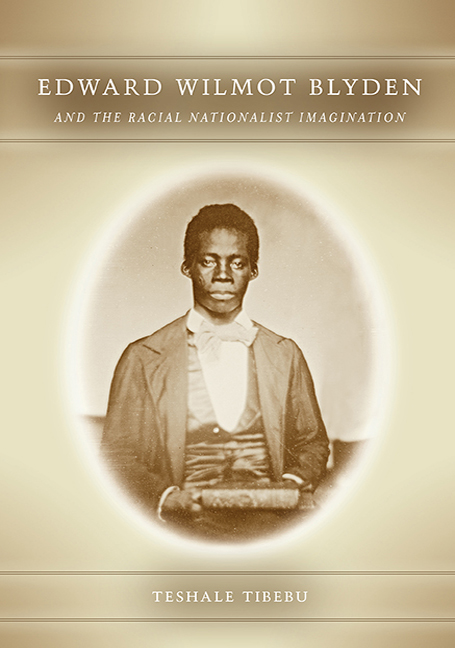Book contents
- Frontmatter
- Dedication
- Contents
- Acknowledgments
- Introduction
- 1 Africa: Service, Suffering, and Subjection
- 2 The Critique of Eurocentrism
- 3 Ishmael in Africa: Black Protestant Islamophilia
- 4 The African American “Civilizing Mission”
- 5 The “Mulatto” Nemesis
- 6 Appraising the Colonial Enterprise
- Epilogue: Post-Blydenian Reflections
- Notes
- Bibliography
- Index
- Frontmatter
- Dedication
- Contents
- Acknowledgments
- Introduction
- 1 Africa: Service, Suffering, and Subjection
- 2 The Critique of Eurocentrism
- 3 Ishmael in Africa: Black Protestant Islamophilia
- 4 The African American “Civilizing Mission”
- 5 The “Mulatto” Nemesis
- 6 Appraising the Colonial Enterprise
- Epilogue: Post-Blydenian Reflections
- Notes
- Bibliography
- Index
Summary
A true respect for the past—a consciousness of a real national history—has not only a binding force but a stimulating effect, and furnishes a guarantee of future endurance and growth. That which has been achieved in the past is a prophecy of what may be done in the future.
—Blyden, Christianity, Islam, and the Negro RaceThis book offers a critical reading of the works of Edward Wilmot Blyden, a seminal figure in modern transnational African thought. It aspires to map the contours and configurations of Blyden's appraisals of the encounter between the black world and the Western world in modern times. It is an undertaking in intellectual history.
Long before the deconstruction discourses of Michel Foucault, Jacques Derrida, and others in the West rocked the boat of Western hegemonic hubris, black men and women on both sides of the Atlantic were cultivating alternative paradigms from the one informed by the self-images of the Western world regarding modernity. The incisive pens of David Walker and Frederick Douglass wrote against the dehumanization of enslaved black humanity. The powerful voice of Sojourner Truth journeyed through the “land of liberty” speaking truth to power. Harriet Tubman, born in slavery, made certain that she was not born for slavery. She traversed long stretches of the land of slaveholders, snatching her people from the inferno of American slavery. She helped overturn the ground of slavery's hold through her underground activities. Harriet Jacobs, born in slavery, exposed the cruel, hypocritical, and dehumanizing world of slavery in her narrative An Incident in the Life of a Slave Girl. Anna Julia Haywood Cooper, born in slavery, earned a PhD in history from the Sorbonne in France and authored A Voice from the South, published in 1892, in which she articulated black feminism. There were many outstanding black leaders in nineteenth-century America that defied the paradigm of white supremacy.
Frederick Douglass, whom Orlando Patterson called “undoubtedly the most articulate former slave who ever lived,” wrote extensively about the despotism of the American slave-holding system. Born in slavery, Douglass penned critical treatises against the slaveholding system, its ideologies, and social practices, and he exposed the hypocrisies of the religious institutions in America that embraced slavery. His was a critique of slaveholding modernity, as well as of the subsequent virulent racism. In their place, he advocated a democratic, humanist alternative.
- Type
- Chapter
- Information
- Publisher: Boydell & BrewerPrint publication year: 2012

